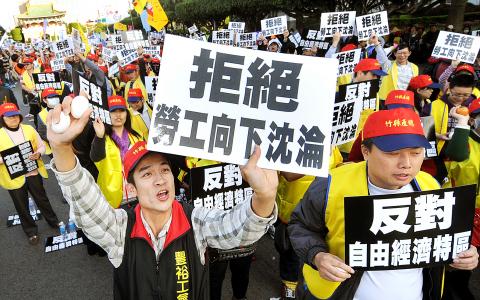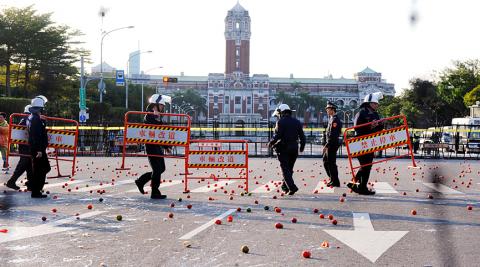Thousands of people from workers’ unions and labor groups took to the streets in Taipei yesterday, demanding that the government protect workers’ rights.
Initiated by the National Federation of Independent Trade Unions (NAFITU), workers organized by more than a dozen groups from across the country arrived at Taipei’s Ximending (西門町) at noon yesterday and headed out to the streets holding signs bearing their demands, such as “basic guarantees,” “uncut payment” and “against the free-trade island [policy] and worsening labor conditions.”
The NAFITU said President Ma Ying-jeou (馬英九) had spoken about the government’s plan for leading the nation to become a “free-trade island,” increasing collaboration between industry and schools and reforming the labor insurance annuity scheme in his speech on New Year’s Day.

Photo: Fang Pin-chao, Taipei Times
However, these policies should not be achieved by sacrificing the working conditions in Taiwan — such as reforming labor insurance by cutting the basic payments for retired workers, or cooperating with the business sector to turn students into cheap labor for companies, it said, adding that the march aimed to make it clear to the president that workers will not accept reforms that only benefit corporations.
NAFITU president Chu Wei-li (朱維立) said the protest appealed for five demands: not cutting the labor insurance annuity payment, basic guarantees for retirement, government budget appropriation to supplement the Labor Insurance Fund if it fails to provide basic guaranteed payments, not loosening labor regulations for a free economic demonstration zone and amending Article 28 of the Labor Standards Act (勞動基準法).
The groups said that the minimum monthly retirement payment from the labor insurance annuity is currently only NT$5,183 after working for 15 years and NT$8,733 after working for 30 years, and an average worker receives only about NT$13,000 — all lower than the government’s data from last year, which showed the average living expenses in Taiwan total about NT$18,465 a month.

Photo: Lo Pei-der, Taipei Times
They urged the government not to cut the labor insurance annuity payment, which is already not enough to maintain average living standards, and said it should guarantee a basic living by supplementing the payment with government funding or from taxes imposed on employers and company owners.
Following the march, the protesters converged in front of the Presidential Office on Ketagalan Boulevard, where the event organizers staged a skit and delivered speeches. The demonstration ended peacefully after the protesters, having been given two warnings by the police that they were violating the Assembly and Parade Act (集會遊行法), threw tomatoes and eggs toward the Presidential Office, from which they were separated by barricades and police.
“We have not seen the government announce policies protecting workers’ rights, nor any sincerity toward workers,” Taoyuan International Airport Services Union standing director Yang Shao-yung (楊少庸) said, adding that despite the large number of protesters, the government failed to even send out an official to meet with them.
“Today we used only tomatoes to express our anger and dissatisfaction. Further demonstrations on larger scales may be held in the future,” he said.

Tropical Storm Gaemi strengthened into a typhoon at 2pm yesterday, and could make landfall in Yilan County tomorrow, the Central Weather Administration (CWA) said yesterday. The agency was scheduled to issue a sea warning at 11:30pm yesterday, and could issue a land warning later today. Gaemi was moving north-northwest at 4kph, carrying maximum sustained winds near its center of up to 118.8kph and gusts of 154.8kph. The circumference is forecast to reach eastern Taiwan tomorrow morning, with the center making landfall in Yilan County later that night before departing from the north coast, CWA weather forecaster Kuan Shin-ping (官欣平) said yesterday. Uncertainty remains and

SEA WARNING LIKELY: The storm, named Gaemi, could become a moderate typhoon on Wednesday or Thursday, with the Taipei City Government preparing for flooding A tropical depression east of the Philippines developed into a tropical storm named Gaemi at 2pm yesterday, and was moving toward eastern Taiwan, the Central Weather Administration (CWA) said. Gaemi could begin to affect Taiwan proper on Tuesday, lasting until Friday, and could develop into a moderate typhoon on Wednesday or Thursday, it said. A sea warning for Gaemi could be issued as early as Tuesday morning, it added. Gaemi, the third tropical storm in the Pacific Ocean this typhoon season, is projected to begin moving northwest today, and be closest to Taiwan on Wednesday or Thursday, the agency said. Today, there would likely

DISRUPTIONS: The high-speed rail is to operate as normal, while several airlines either canceled flights or announced early departures or late arrivals Schools and offices in 15 cities and counties are to be closed today due to Typhoon Gaemi, local governments announced last night. The 15 are: Taipei, New Taipei City, Taoyuan, Tainan, Keelung, Hsinchu and Kaohsiung, as well as Yilan, Hualien, Hsinchu, Miaoli, Chiayi, Pingtung, Penghu and Lienchiang counties. People should brace for torrential rainfall brought by the storm, with its center forecast to make landfall on the east coast between tonight and tomorrow morning, the Central Weather Administration (CWA) said. The agency issued a sea warning for the typhoon at 11:30pm on Monday, followed by a land warning at 11:30am yesterday. As of

CASUALTY: A 70-year-old woman was killed by a falling tree in Kaohsiung as the premier warned all government agencies to remain on high alert for the next 24 hours Schools and offices nationwide are to be closed for a second day today as Typhoon Gaemi crosses over the nation, bringing torrential rain and whipping winds. Gaemi was forecast to make landfall late last night. From Tuesday night, its outer band brought substantial rainfall and strong winds to the nation. As of 6:15pm last night, the typhoon’s center was 20km southeast of Hualien County, Central Weather Administration (CWA) data showed. It was moving at 19kph and had a radius of 250km. As of 3pm yesterday, one woman had died, while 58 people were injured, the Central Emergency Operation Center said. The 70-year-old